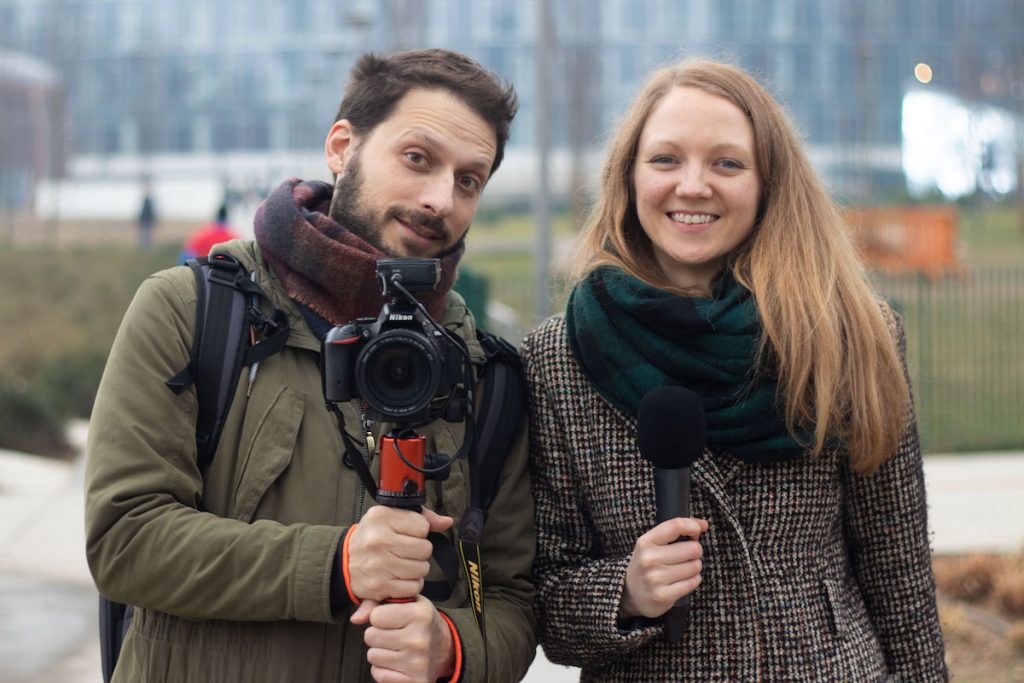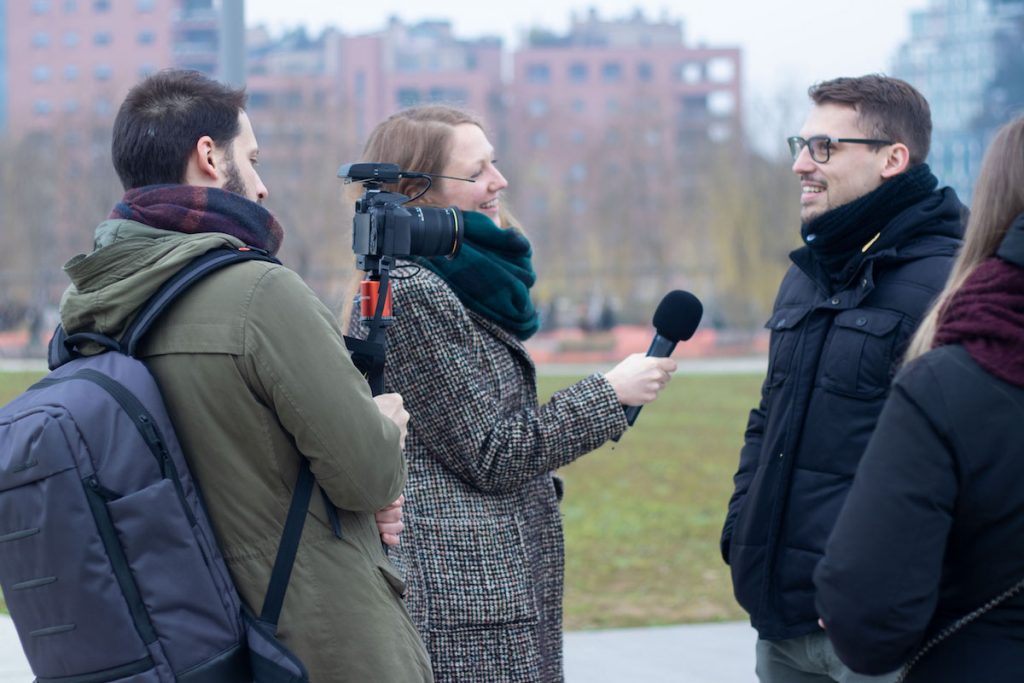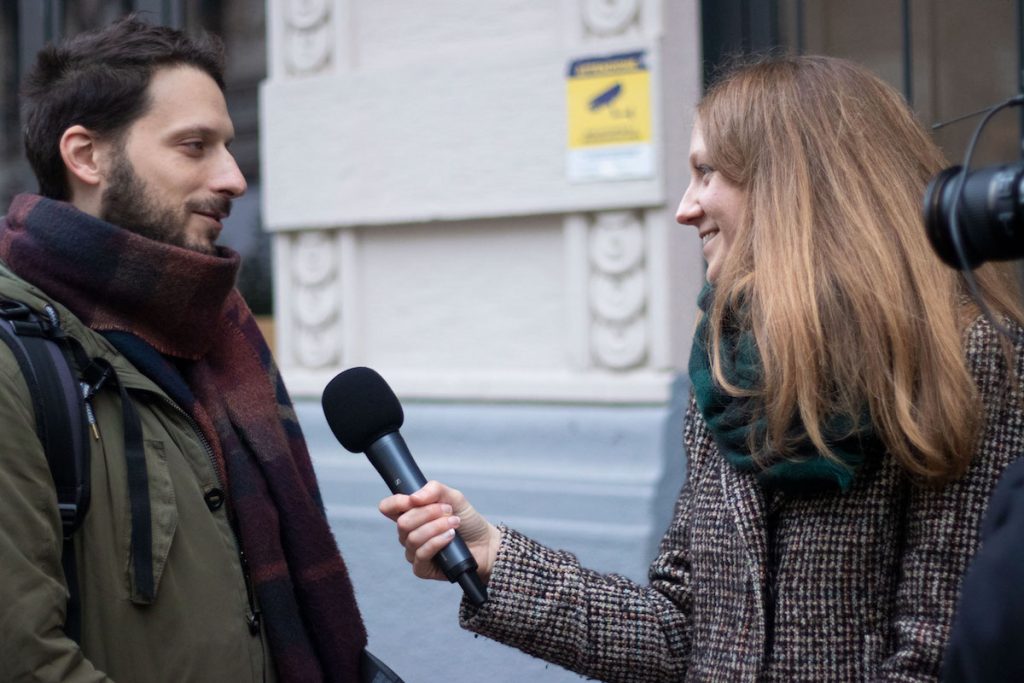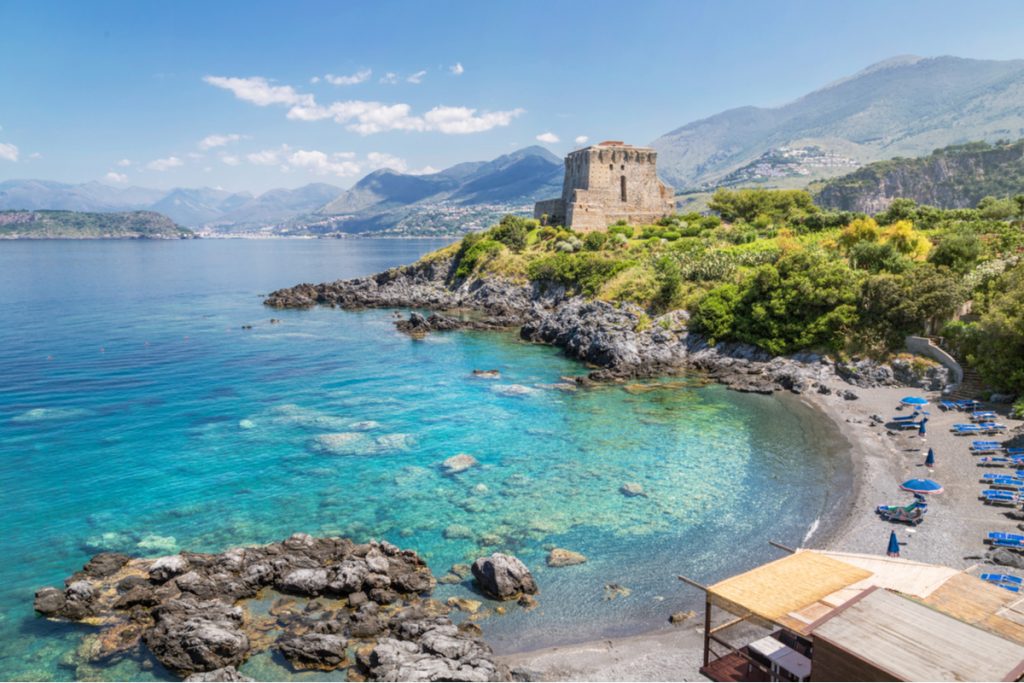Live in Italy Magazine Launches its Digital Edition!
Katie Harris and Matteo Alabiso (based in Milan) are founders of Easy Italian that is part of the global project Easy Languages.

Live in Italy Magazine is proud to present its first, “Chat with an Expat” and launch a new digital edition so you can stay connected with us even if you’re in “airplane mode.” We recently interviewed Katie Harris who founded the Easy Italian YouTube channel with her boyfriend, Matteo Alabiso. Learn how important it is to jump in and start speaking Italian, ways to learn with Katie and Matteo and much more.
Andiamo!
How old are you?
I’m 34 and Matteo is 38.
Where were you born and raised?
I was born near London and grew up in Sheffield, while Matteo is Neapolitan born and bred.
Where did you go to school?
I studied linguistics at Cambridge and UCL (University College London.) Matteo studied graphic design at ILAS (ILAS® Visual Communication School) in Naples.
What was the first language that you learned and how?
Italian was my first language love, but it wasn’t love at first sight! I started trying to learn Italian at University in the UK, but really struggled. I was bottom of my class and nearly got thrown off the course. After a couple of years sitting in the classroom feeling confused and behind, I still hadn’t learnt anything useful for real conversations.
Then as I was about to leave for a year abroad in Italy, I set myself a rule: I could only speak Italian for the whole year. No English, apart from to keep in contact with friends and family back home. It was difficult to make friends at first because I spoke slowly and painfully. But after a few months of awkward conversations and embarrassing mistakes (a good sense of humour is essential!), I was speaking Italian.
Matteo had a similar experience with English. He studied it for many years at school but couldn’t speak it at all. He learned to understand natural spoken English by soaking his brain in the language via computer games and watching films. Then, he got thrown into the deep end when he met my friends and family. After a few months of awkward conversations and embarrassing mistakes (he had to laugh at himself a lot too!), he was speaking English.
How many languages do you speak?
I also speak French, Spanish and some Chinese and German.
What language was the most difficult to learn?
Chinese is taking the longest, so sometimes it can be hard to keep the motivation up.
Do you feel that anyone can be a polyglot*, or is it a special gift?
We both think that anyone can learn. We were terrible at languages at school, so if we can do it, anyone can!
* Polyglot: a person who knows and is able to use several languages.

Tell us about Easy Languages/Easy Italian
Before joining Easy Italian, I was a fan of Easy Languages and had been watching Easy German and Spanish for many years. We love the method – it fits in perfectly with our philosophy on language learning. By doing street interviews, Easy Languages breaks away from the academic tendency to strip a language down to rules and lists. They put the focus on the interesting bit, the people!
It’s more fun to learn with real people, because you’re curious about what they have to say, so you pay attention and learn more. Also, you can practice listening to how natives actually talk, rather than a watered-down course-book version.
We love being part of the Easy languages team, it’s a fab project to work on.
When did you move to Italy and why?
After my year abroad in Italy, I decided to live in Italy for a while longer and found a job in Milan. That was ten years ago, and I’ve been here ever since. I decided to make Italy my home because I love how Italians prioritise the two most important things in life: people and food.

Tell us briefly about Matteo, such as your business partnership and who has what task? How did you meet?
I met Matteo in Milan. I was teaching English and Matteo had just started working in a graphic design studio. We had a few mutual friends, so we would often see each other out or at dinner parties, but we didn’t talk much. One evening, about a year after we met for the first time, we ended up sitting next to each other and got along really well. After that evening, Matteo started texting me more often and I texted back, with a little help from my Italian dictionary.
I’ve been a language teacher for many years, so I deal with the didactic side of the videos, which topics to teach and how to teach them. Matteo has graphic design experience, so he takes care of the visual aspects, such as filming and editing.
How long did it take to get almost 60K subscribers on YouTube and what are your goals for Easy Italian as it continues to grow?
It took us around a year, with help from the Easy Languages project. We’re excited to have so many people in our community who want to learn Italian!
As the channel continues to grow, we’d love to travel to hidden corners of Italy and interview people there so our viewers can discover more of Italy’s diverse culture.
Briefly, explain your “learning Italian” philosophy.
Italian is a tool to communicate with Italians. You don’t need to spend so much time memorising or stressing about getting it perfect. The most important thing is to practice lots of listening and speaking, so you can understand and make yourself understood in conversations.
As soon as you’ve got a foundation, start reading and listening to things you enjoy, like books and TV shows. You can use tools to make things easier in the beginning, like stories and shows that have been adapted for learners. They’re especially handy if they have dual-language subtitles, like the ones on Easy Italian. Try to understand what you can and don’t stress if you don’t get everything yet, it will come with time and practice.
And talk to native speakers, or anyone who speaks the language, as much as you can. Even if it’s slow and awkward at first, it will get easier. Nowadays, it’s easy to find opportunities to practice conversations online.
Tell us a little more about your intensive Italian immersion vacations.
The idea is to help students learn Italian by “living” it. For a whole week, we gently help students speak in Italian while we explore the area together – trips out into the hills, markets, cooking classes and lots of time in piazzas sipping wine. After a few days of speaking only Italian, something clicks, and you start to think in the language. After a week, we’ll be sitting at a café over a coffee and, while students might not say everything perfectly yet, the conversation flows. Seeing the change in how people speak Italian from the beginning to the end of the week is our favourite part of the job.

As an expat, what do you miss the most? What has been the biggest challenge in adapting to a life in Italy?
People in Italy tend to be really community oriented, which is usually a good thing. Italians will drop everything to talk or to have lunch and dinner together.
But this focus on community also means it’s more normal to get involved in other people’s business. In London, if you do or wear something a little different, no one even notices, whereas in Milan you can expect a lot of curious stares! There’s a lot of social pressure to do things in a certain way and I often find myself missing the live and let live approach of the UK.
What recommendations do you have for anyone wishing to move to Italy (permanently or for an extended stay?)
Don’t be afraid to reach out to Italians, even if your Italian isn’t great yet. They’re a friendly bunch and any attempt to connect is usually welcome. Italians would much prefer you try to socialise, even if it means sounding a bit silly, or resorting to English, rather than acting cold or distant because you’re afraid to start a conversation.
Being in a foreign country is awkward and you won’t always know the right thing to say or do, but as long as you’re friendly, most Italians will be friendly back.
Before you come, you can connect with Italians online on websites like italki. Once you’re here, you can do it every time you leave the house, with the barista, at the supermercato….
What is your personal definition of an “expat.”
Expat can sometimes be a loaded word, because it’s essentially an immigrant who comes from richer, “western” cultures. It would be great to have the same word for everyone: either we’re all immigrants or we’re all expats. I’d say an immigrant/expat is a brave (some might say masochistic!) person who is willing to sacrifice their “normal” to create a new and better life.
When should a person begin learning Italian, before or after moving to Italy?
Try to learn some before you get here. It’s easy to fall into the trap of putting it off by thinking that everything will be easier when you get here (that’s what I did!) but it’s not necessarily true. There are lots of foreigners living in Italy who don’t speak Italian, so just being here isn’t an elixir.
And it’s not just about learning the vocabulary and grammar. The soft skills you develop when learning language at home, like consistency, plucking up courage to speak, being patient with yourself, will make learning Italian easier when you get here.
It’s easy to find opportunities to practice Italian online, so we’d definitely recommend getting a foundation before you come. That said, the most important thing is to learn it, so either way is good!

What is the most beautiful place that you’ve visited in Italy? And, where do you go to get away from work?
We’re a bit biased because Matteo’s from Naples, so that whole area. Naples is a city full of contradictions, there’s a kind of laidback chaos that people either love or hate (we love it!). You’ve also got the Amalfi Coast. Aceroli is where lots of Neapolitans go to get out of the city, with its beaches and rolling hills. In that part of the world, there’s almost always Vesuvius and Capri on the horizon, and the food and wine are phenomenal.
Then there’s San Nicola in Calabria, where Matteo used to go on vacation as a child. Cliffs, coves, and very blue waters. Beautiful sunsets, little squares where you can have a glass of wine in the evening and great gelaterias. There are a lot of tiny places along the coast that are still untouched by international tourism.
Then there’s Molise, Puglia, Sicily… Ci dispiace, we can’t choose. It would be like choosing a favourite child.
From where we live in Milan, the lakes and mountains are a short, cheap train ride away, so that’s perfect for hopping into nature for an afternoon.
Briefly give some information about the lessons that someone will receive when becoming an Easy Italian Patreon subscriber.
Subscribers get extra resources to learn from the videos, like quizzes and exercises to learn the important words and vocabulary from the videos. Matteo makes these and they’re really fun with crosswords and other games. There are also mp3s with the audio so you can listen to them on the go, including a slow audio version so you can focus on the details. And if you want a challenge, you can get the video with no subtitles at all and join our Whatsapp group to practice chatting Italian with us daily.
Can You Roll Your R’s Like an Italian?
Start with the very basics with Katie and Matteo and then become more immersed in the language. Don’t forget to make fun of yourself too! Check out this video:
It’s Easy to Stay Connected with Easy Italian!
Easy Italian is a project to help you learn Italian in an authentic and fun way. Katie and Matteo, based in Milan, interview people in the streets of Milan and other cities of Italy. All of their videos have subtitles in Italian and English.
To deepen your learning experience with, become a member of Easy Italian through Patreon (www.patreon.com/easyitalian) and receive exercises, transcripts and further extras that they create for our members each week.
Practice learning Italian in the kitchen. Read a recipe for Sugo di Uva Fragola in Italian featured in Live in Italy Magazine’s Food and Wine section.
Stay tuned for our next, “Chat with an Expat” with Ashley Bartner of La Tavola Marche.



How do I chat with Katie and Matteo on WhatsApp? I’m already a member of their community.
Hi Vic: We only interviewed Katie and don’t know how to chat with her. Visit their website and social media and try to send them a message there. Hope that you are enjoying Italian with them. They’re great!
Hello. I subscribe to Kstie and Matteos utube channel and would like to receive their documents as well to learn Italian but I am unable to find a contact number to receive them. I live in UK and I am not on Facebook or Instagram.
If you can help I would appreciate it.
Kind regards
Elaine
Hello Elaine, We’re not sure how to get a hold of them either, but will look into it. This was one of our first interviews, so we’ve lost touch.